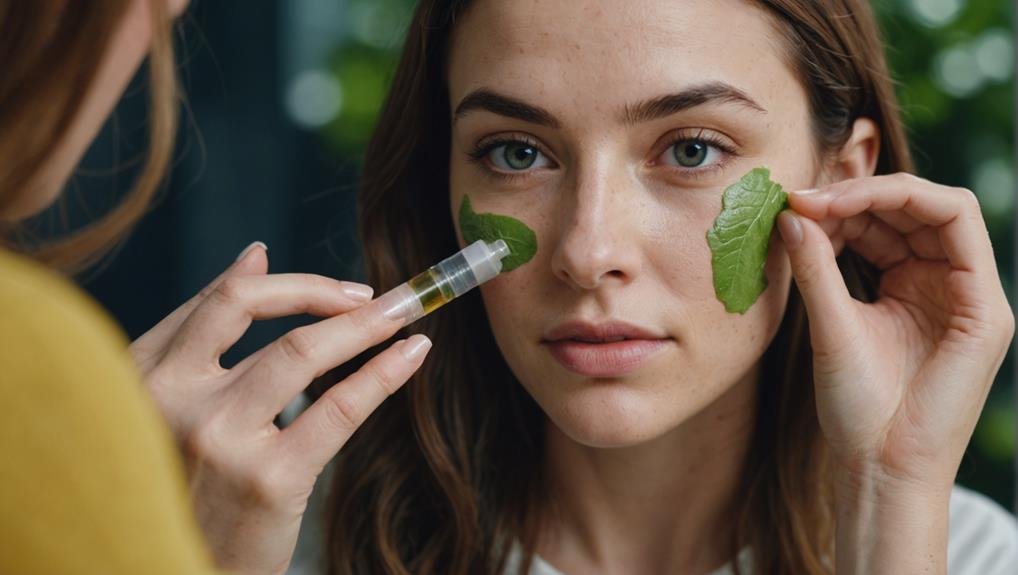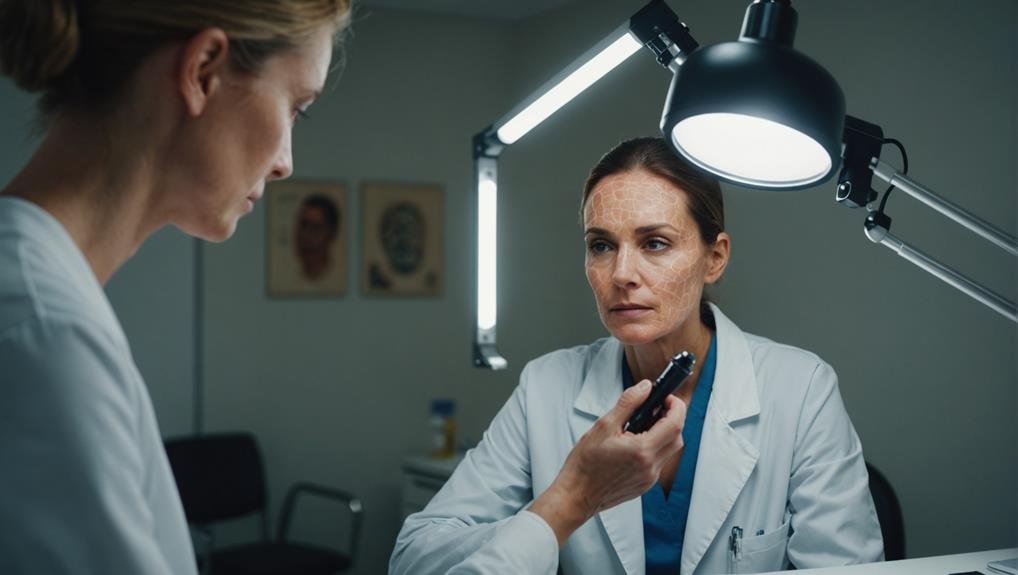"Cherishing Little Steps - A Haven for Baby and Family Journeys"
How to Prevent and Treat Skin Discoloration#COMMA
To effectively address skin discoloration, you must first understand its triggers and adopt a comprehensive approach that goes beyond just skincare products. By taking proactive steps to protect your skin from the sun, maintaining a gentle cleansing routine, and incorporating antioxidant-rich products, you can make significant strides in managing discoloration. However, the key lies in not only preventing but also treating existing issues. Stay tuned to discover the holistic strategies and expert recommendations that can help you achieve a more even and radiant complexion.
Key Takeaways
- Daily sun protection with SPF 30+
- Gentle cleansing routine with mild products
- Incorporate antioxidants in skincare
- Use targeted treatment products like vitamin C serums
Understanding Skin Discoloration

To understand skin discoloration, it's essential to grasp the underlying causes that lead to this common cosmetic concern. Skin pigmentation plays a significant role in determining your skin tone. Hyperpigmentation, one of the primary causes of skin discoloration, occurs when there's an excess production of melanin in certain areas of the skin.
This can be triggered by various factors such as sun exposure, hormonal changes, skin injuries, and inflammation.
Sun exposure is a major contributor to hyperpigmentation. UV rays stimulate the production of melanin as a defense mechanism against the sun's damaging effects. Hormonal changes, particularly during pregnancy or while taking certain medications, can also lead to increased melanin production, resulting in dark patches on the skin.
Additionally, skin injuries like acne or cuts, as well as inflammatory skin conditions, can cause post-inflammatory hyperpigmentation, leaving behind discolored spots. Understanding these hyperpigmentation causes is crucial in effectively treating and preventing skin discoloration.
Identifying Common Triggers
Understanding the common triggers for skin discoloration involves recognizing the various factors that can contribute to the development of pigmentation irregularities on your skin. Your skincare routine plays a crucial role in preventing skin discoloration. Harsh products, lack of hydration, and inadequate sun protection can all lead to pigmentation issues.
It's essential to choose gentle products suitable for your skin type and incorporate ingredients like vitamin C or niacinamide known for their brightening properties.
Additionally, your makeup techniques can also impact skin discoloration. Applying makeup harshly or using expired products can irritate the skin, leading to discoloration over time. Always remove makeup before bed and ensure your brushes and sponges are clean to prevent bacterial growth that can worsen pigmentation problems.
Opt for non-comedogenic and hypoallergenic makeup to reduce the risk of skin reactions that may result in discoloration. By being mindful of your skincare routine and makeup application, you can help prevent skin discoloration and maintain a radiant complexion.
Daily Sun Protection

Proper daily sun protection is essential for preventing skin discoloration and maintaining skin health. Sunscreen application is a crucial step in your skincare routine. Choose a broad-spectrum sunscreen with an SPF of 30 or higher and apply it generously to all exposed skin, including your face, neck, ears, and hands. Reapply every two hours, especially if you're outdoors or swimming.
In addition to sunscreen, protective clothing plays a vital role in shielding your skin from harmful UV rays. Opt for tightly woven fabrics that cover your arms and legs, along with wide-brimmed hats to protect your face and neck. Sunglasses with UV protection are also important to safeguard the delicate skin around your eyes.
Gentle Cleansing Routine
Maintaining a gentle cleansing routine is essential for keeping your skin healthy and free from impurities. To ensure your skin stays radiant and clear, consider the following tips:
- Exfoliation Benefits: Regular exfoliation helps remove dead skin cells, unclogs pores, and promotes skin cell turnover. Look for gentle exfoliators with ingredients like glycolic acid or salicylic acid for effective yet non-abrasive exfoliation.
- Product Recommendations: Opt for cleansers with mild formulas that suit your skin type. Consider products that are fragrance-free, non-comedogenic, and dermatologist-tested to avoid irritation and breakouts.
- Hydrating Masks: Incorporate hydrating masks into your skincare routine to provide an extra boost of moisture. Look for masks with ingredients like hyaluronic acid or ceramides to help nourish and replenish your skin.
- Overnight Treatments: Using overnight treatments like serums or creams can help repair and rejuvenate your skin while you sleep. Products containing retinol or vitamin C can target discoloration and promote a more even skin tone.
Incorporating Antioxidants

To enhance your skin's defense against environmental stressors and promote overall skin health, consider incorporating antioxidants into your skincare routine. Antioxidants play a crucial role in neutralizing free radicals that can lead to skin damage and discoloration.
You can introduce antioxidants through both topical products and your diet. Start by including antioxidant-rich foods like berries, nuts, and leafy greens in your meals to support your skin from the inside out.
In addition to dietary sources, topical antioxidants such as vitamin C, vitamin E, and green tea extract can be applied directly to the skin to provide an extra layer of protection against oxidative stress.
For a more targeted approach, oral supplements containing antioxidants like resveratrol or CoQ10 can also be beneficial in supporting skin health. When choosing skincare products or supplements, opt for those with proven antioxidant properties to maximize the benefits for your skin.
Targeted Treatment Products
Consider incorporating targeted treatment products into your skincare regimen to address specific skin concerns effectively.
When dealing with hyperpigmentation, it's crucial to choose products with ingredients known for their effectiveness in treating such issues. Here are some product recommendations to help you achieve a more even skin tone:
- Vitamin C Serums: Known for their brightening properties, vitamin C serums can help fade dark spots and even out skin tone. Incorporate this into your morning routine for best results.
- Retinol Creams: Retinol is a powerhouse ingredient that aids in cell turnover, helping to reduce the appearance of hyperpigmentation over time. Use retinol creams at night to allow for optimal absorption.
- Hydroquinone Treatments: Hydroquinone is a skin-lightening agent that can be effective in targeting specific areas of hyperpigmentation. Consult with a dermatologist before incorporating hydroquinone into your routine.
- Alpha Arbutin Products: Alpha arbutin is a gentler alternative to hydroquinone and can help inhibit melanin production, making it a suitable option for those with sensitive skin. Integrate alpha arbutin products into your evening skincare routine for best results.
Professional Skin Assessments

Engage a qualified dermatologist or skincare professional to conduct a thorough assessment of your skin's condition and needs. Skincare consultations with experts are essential for understanding the root causes of skin discoloration. During the assessment, your professional will evaluate factors such as pigmentation issues, sun damage, and skin sensitivity to provide personalized recommendations tailored to your specific needs.
Expert advice gained from a professional skin assessment can lead to effective treatment options. By analyzing your skin type and identifying any underlying conditions contributing to discoloration, your dermatologist or skincare professional can recommend targeted products and procedures to address the discoloration.
These recommendations may include specialized skincare products, professional treatments like chemical peels or laser therapy, and lifestyle modifications to prevent further skin damage.
Lifestyle Modifications
Make adjustments in your daily habits and routines to support healthier skin and reduce the likelihood of skin discoloration. When it comes to lifestyle modifications, focusing on your diet and stress management can significantly impact the health and appearance of your skin.
Here are some tips to help you make positive changes:
- Diet Changes: Incorporate a variety of fruits, vegetables, whole grains, and lean proteins into your meals. Antioxidant-rich foods like berries and leafy greens can help combat oxidative stress and promote skin health.
- Stay Hydrated: Drink an adequate amount of water daily to keep your skin hydrated and supple. Hydration plays a crucial role in maintaining skin elasticity and radiance.
- Manage Stress: Practice stress-reducing techniques such as meditation, yoga, or deep breathing exercises. Chronic stress can trigger inflammation in the body, leading to skin issues like discoloration.
- Prioritize Sleep: Ensure you get enough restful sleep each night. Quality sleep is essential for skin cell regeneration and repair, helping to maintain a healthy complexion.
Dietary Considerations

How can your dietary choices impact skin discoloration and overall skin health? Consuming a diet rich in essential nutrients is crucial for maintaining healthy skin and preventing skin discoloration. Including a variety of fruits, vegetables, whole grains, and lean proteins in your meals can provide your skin with the necessary vitamins and minerals it needs to stay vibrant and even-toned.
Additionally, incorporating nutritional supplements like vitamin C, vitamin E, and zinc into your diet may help in reducing skin discoloration and promoting skin healing.
Ensuring that you eat balanced meals that contain a mix of macronutrients such as carbohydrates, proteins, and healthy fats can also contribute to skin health. These nutrients play a significant role in supporting skin cell regeneration, collagen production, and overall skin function.
Importance of Hydration
Staying adequately hydrated is essential for maintaining healthy skin and preventing skin discoloration. Dehydration can lead to dryness, dullness, and even skin issues like eczema. Here are some key points to consider in relation to water intake and moisturizing routines:
- Water Intake: Ensure you're drinking enough water throughout the day. Water helps flush out toxins from your body, keeping your skin clear and hydrated. Aim for at least 8 glasses of water daily.
- Moisturizing Routines: Use a good quality moisturizer that suits your skin type. Moisturizing regularly helps to lock in hydration and create a protective barrier on your skin. Apply moisturizer after showering or washing your face.
- Hydrating Foods: Incorporate water-rich foods like cucumbers, watermelon, and oranges into your diet. These foods can contribute to your overall hydration levels.
- Humidifiers: Consider using a humidifier in your home, especially during the dry winter months. Humidifiers add moisture to the air, preventing your skin from drying out.
DIY Remedies to Try

To explore natural solutions for skin discoloration, consider trying out DIY remedies that can be beneficial for your skin health. Home remedies using natural ingredients can help in evening out skin tone and reducing discoloration. Below are some DIY remedies you can easily try at home:
| Natural Ingredient | Home Remedy |
|---|---|
| Lemon Juice | Mix lemon juice with honey and apply it to the affected areas. Lemon is known for its skin-brightening properties. |
| Aloe Vera | Apply fresh aloe vera gel directly to the discolored skin. Aloe vera has soothing and healing properties that can help with pigmentation issues. |
| Turmeric | Make a paste of turmeric powder, milk, and honey. Apply it to the skin and leave it on for 15-20 minutes before rinsing off. Turmeric is a natural skin brightener. |
These DIY remedies can be a gentle yet effective way to address skin discoloration. Remember to perform a patch test before trying any new ingredient to ensure you do not have any allergic reactions.
Consultation With Dermatologist
Consider scheduling a consultation with a dermatologist to address your skin discoloration concerns effectively. Here are some reasons why consulting a dermatologist can be beneficial:
- Treatment Options: Dermatologists can provide you with a range of treatment options tailored to your specific skin type and condition, ensuring effective results.
- Skincare Routines: They can recommend personalized skincare routines that target your skin discoloration issues and promote overall skin health.
- Product Recommendations: Dermatologists can suggest clinically proven skincare products that are suitable for your skin and can help in reducing discoloration.
- Medical Advice: By consulting a dermatologist, you can receive expert medical advice on how to prevent further skin discoloration and maintain a healthy complexion.
Visiting a dermatologist not only offers you access to professional expertise but also ensures that you receive personalized care and treatment for your skin discoloration concerns.
Frequently Asked Questions
Can Hormonal Changes Cause Skin Discoloration?
Hormonal changes can indeed cause skin discoloration. To help manage this, focus on maintaining balanced dietary habits and a consistent skincare routine. These practices can assist in mitigating the effects of hormonal fluctuations on your skin.
How Can Stress Impact Skin Pigmentation?
Stress, friend or foe? Your skin knows. Sun exposure aggravates pigmentation changes caused by stress. Prioritize skin care to combat these effects. Manage stress, shield from the sun, and embrace a healthy skin routine.
Is Skin Discoloration Hereditary?
Skin discoloration can be hereditary, influenced by genetic predisposition. Ethnic background and lifestyle choices also play a role. Environmental factors like sun exposure can exacerbate pigmentation issues. Understanding these factors can help manage skin concerns.
Can Allergies Contribute to Skin Discoloration?
Allergies can indeed contribute to skin discoloration. Seasonal changes may worsen symptoms, impacting your complexion. Research shows a correlation between dietary habits and skin reactions. Understanding triggers can help manage skin discoloration effectively.
Are There Specific Fabrics That Worsen Skin Pigmentation?
When it comes to skin pigmentation, certain fabric choices can worsen the condition. Opt for breathable clothing materials like cotton to prevent discoloration. Avoid synthetic fabrics that may irritate and exacerbate skin pigmentation issues.
Conclusion
In conclusion, by incorporating daily sun protection, gentle cleansing routines, antioxidant-rich foods, and seeking advice from a dermatologist, you can effectively prevent and treat skin discoloration.
Did you know that studies have shown that up to 80% of skin aging is caused by sun exposure? By taking proactive steps to care for your skin, you can maintain a healthy and radiant complexion for years to come.

